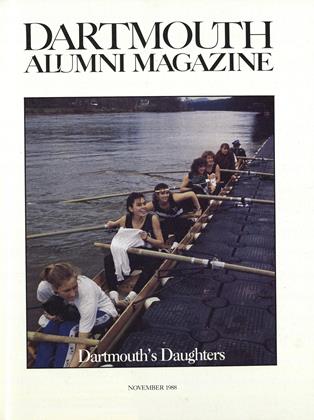This structure on the Green, built by the class of 1954 as a "frosh dedication to the sophomores," is a monument (albeit an especially cheeky one) to inter-class rivalry throughout Dartmouth's history.
1799
"Fagging" introduced. A College regulation requires freshmen to run errands "for all the Senior classes who have themselves served a freshmanship."
1865
The faculty votes to insist that each sophomore pledge not to insult or abuse any freshman.
1879
A riot over a barrel of lemonade leads to the annual tradition of "Wet Down." The imbroglio eventually evolves into a gauntlet of upperclassmen armed with belts. The tradition lasts until 1967.
1883
The tradition of "Cane Rush" reaches its apex. The freshmen strip to the waist, oil their torsos, and attempt to keep a hickory cane from the sophomore class. After two hours the sophomores triumphantly deliver the cane to Reed Hall. Several students are treated for concussions.
1916
The freshmen win the annual "Football Rush," a practice similar to its predecessor, Cane Rush. The class of 1920 is permitted for the first time to walk on the grass.
1945
World War veterans matriculate at the College. Upperclassmen discover that many freshmen are older than they and seasoned by war. Freshman hazing suffers a lapse.
1953
Football rash is replaced by a tug of war, and the injury rate diminishes. If the freshmen win, they are allowed to doff their beanies; if they lose, the beanies stay on until Houseparties Weekend in.November.
1973
Freshmen are no longer required to wear beanies or caps.
1988
"We don't harsh on the freshmen anymore," an upperclassman tells an Alumni Magazine editor. Nonetheless, before Dartmouth Night the class of 1992 stands an all-night watch around the bonfire to prevent sophomore sabotage.
 View Full Issue
View Full Issue
More From This Issue
-
 Cover Story
Cover StoryDaughters of Dartmouth
November 1988 By Anne Bagamery '78 -
 Feature
FeatureGlory Days
November 1988 By Woody Klein '51 -
 Feature
FeatureThe Helplessness of a "Bureaucrat of Legendary Proportions"
November 1988 By Jonathan Cowan '87 -
 Feature
FeatureQuestion: What Professional School Gives Credit for Throwing Pies?
November 1988 By Steve Lough '87 -
 Feature
FeatureGetting Gored by a Rhinoceros Was Only Half the Experience
November 1988 By Emily Hill '90 -
 Sports
SportsANOTHER SHOT
November 1988







